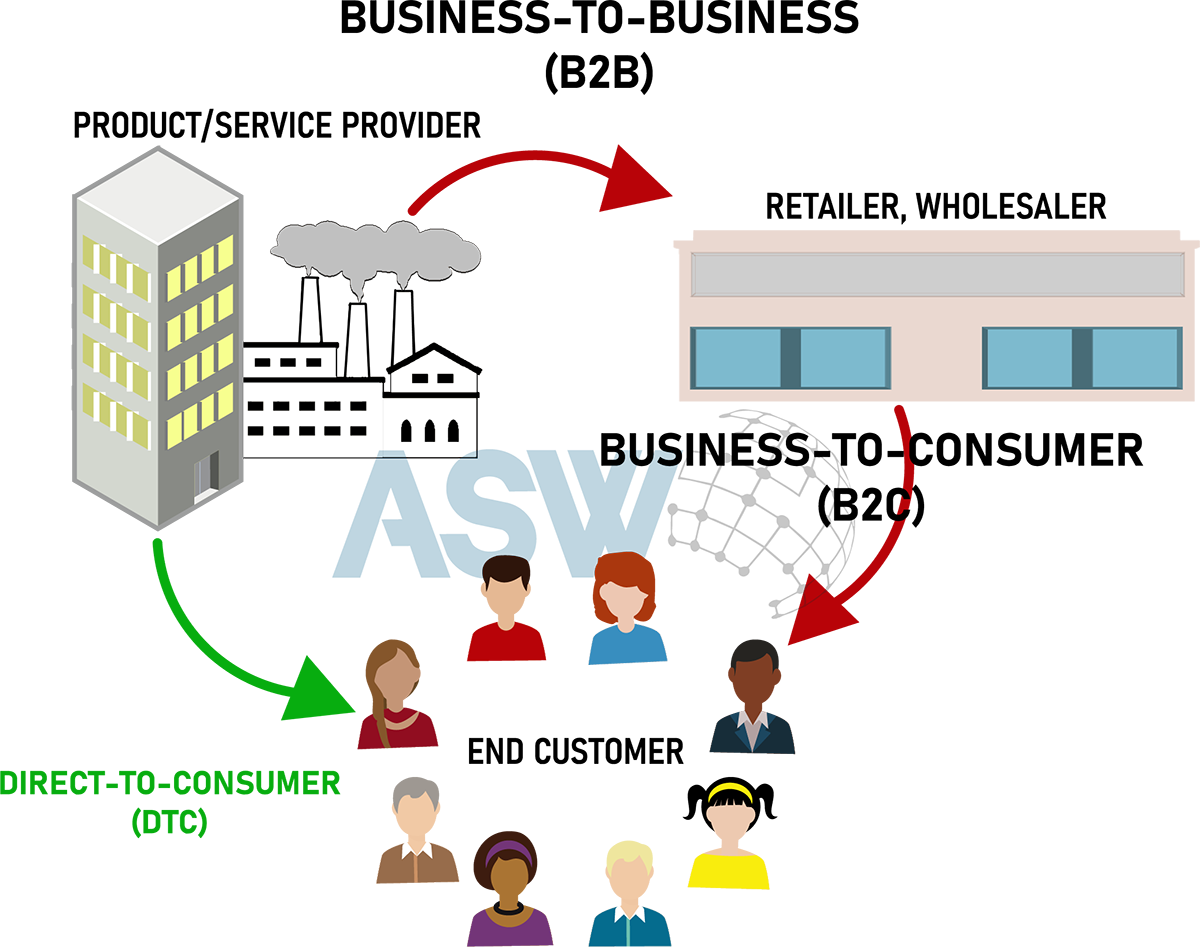Overview
If you're a supplier, you've probably been asked by fellow suppliers and corporate buyers if you are B2B or B2C. What about DTC, which is being talked about more and more? Sometimes even seasoned fulfillment experts use B2C and DTC interchangeably. B2C stands for Business-to-Consumer and refers to goods or services sold by a business to end customers. DTC (or D2C) stands for Direct to Consumer. In simple terms it means that orders are fulfilled and shipped directly to the end customer. Sounds like B2C, you might say, but that doesn't tell the whole story.
Some experts prefer to think of DTC as a subset of B2C, and that's fair if you consider that, for both, the service or product is intended for individuals, for their own private use, rather than a company.* Typically, though, the dividing line that separates DTC from B2C is that DTC does not involve a middle distribution channel. That is, sales are directly to end customers rather than retailers or wholesalers.

Concrete Examples
Think about the Consumer Packaged Goods (CPG) industry. Brands such as Coca-Cola typically sell their manufactured goods to retailers or wholesalers, who then sell to end customers. To get a bottle of Coke, end customers don't call up Coca-Cola or go to their website and make a purchase. They go to the grocery store, warehouse club, Mom and Pop corner store, ball game, etc. Coca-Cola is a B2C company, selling products to consumers, but they are not a DTC company, selling to consumers directly. Contrast that with a retailer like that grocery store selling the Coke. That retailer is selling directly to the consumer.
Let's take a more apples to apples comparison: Nike is a brand similar to Coca-Cola. Nike sells its goods via retailers and wholesalers like Coca-Cola does. It is a B2C company. However, Nike also sells its products directly to end customers. A regular Joe or Jill can go to Nike's website and buy a pair of sneakers—that makes Nike also a DTC company. Since the Pandemic, other B2C companies have transitioned to being DTC companies—either exclusively or (typically) selling to retailers and wholesalers, while also branching out to DTC.
DTC Ecommerce & the Role of 3PL's
How do ecommerce and 3PL's fit in? Ecommerce is business conducted electronically. Typically we think of web stores, but it can also include other electronic transactions (such as orders taken manually—by phone, for instance—and entered into a computer that then electronically communicates with software to fulfill the order. 3PL's are third-party logistics providers—companies with which a business partners in order to handle all or part of its distribution needs.
With ecommerce fulfillment, a 3PL can be outsourced to handle the warehousing of the product, manage inventory, process all orders and payments, pick and pack orders, kit them if necessary, and ship them to the end customer. The 3PL can either receive the order via integration with the seller's internal platform or by creating a custom online store that it will manage independently but design with input from the seller. The 3PL can also process any returns—the electronic transaction, physical receipt, and re-stocking of the product.
*Those that take a generalist approach argue that companies are also consumers, and in some instances can be the end customer; therefore, they say, DTC includes B2B. However, the term "consumer" is typically applied to individuals who are using a product or service for their own personal use.
It is interesting to consider situations in which a seller's clients are other companies (B2B), but the seller processes orders for individual employees (for their own consumption) and ships directly to them. Think about company web stores where any employee can purchase a company-branded item. Or an awards & incentives program in which individual employees are recognized and rewarded. But while "end customers" refers to employees (who are enjoying or benefitting from the product or service), the client company has the ultimate authority over the store or incentive program, each of which exists to advance the client's brand and objectives. In those cases, while shipment is directly to the end customer, the interaction itself is part of a B2B transaction.
